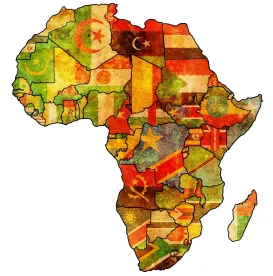For years, many observers treated Africa’s plans for regional integration with a healthy dose of skepticism. Though the skepticism remains, what has changed is the wide-spread acknowledgement and elevated importance of regional economic integration to grow Africa’s economies, create jobs for its rapidly growing youth population, and improve lives. Last month’s AGOA Forum, hosted by Gabon, was an opportunity not only to celebrate the accomplishments over the last fifteen years in increasing African exports to the U.S., but also to discuss in earnest how to remove some of the major impediments to greater utilization of AGOA duty-free privileges.
At AGOA, discussants and panelists explained how “supply-side” constraints are limiting growth in trade and economic expansion. For example, much has been reported on Africa’s crisis in infrastructure: few paved roads and highways, port congestion, and lack of power, are among chief concerns. Yet nearly equally costly is the fragmentation of Africa’s markets. African countries remain dependent on the actions of their neighbors in order for their products to be competitive regionally and globally. An export-oriented company in Ethiopia depends on an efficient border, customs service, and port in Djibouti, for example, in order to thrive. Developing sets of common standards and procedures, limiting idle time spent at border crossings, and speeding up cargo delivery at ports – all supply-side constraints – form a major part of the agenda for regional integration. This trade facilitation and capacity building is critically needed in Africa, as all stakeholders at the AGOA Forum acknowledged.
Soon, in December, Nairobi will host the biennial WTO Ministerial (MC 10) – the first time on the African continent – where trade ministers will discuss, among other topics, how to effect the WTO Trade Facilitation Agreement (TFA), which the WTO General Council approved in November 2014. The TFA, which calls on countries to streamline and simplify trade and customs rules and procedures, allows for a transition period for developing economies and least-developed countries. (Most African countries fall into these two categories.) During this transitional period, countries may avail themselves of technical assistance and other support for building trade capacity within their countries in order to conform to articles in the Agreement.
President Obama’s Trade Africa Initiative is expanding its reach to support more countries in trade capacity building and is being somewhat re-oriented to align with the commitments under the TFA. This is a very welcome outcome. However, as this presidential initiative grows, one might question whether it – and U.S. government support for trade facilitation and trade capacity building – is structured in a way to achieve optimal outcomes and results. The Office of the U.S. Trade Representative leads trade policy and negotiations for the U.S. government, but it lacks authority to oversee or coordinate the technical assistance that the U.S. government allocates through multiple agencies to African governments. Moreover, the U.S. government treats each of the five regional economic communities in Sub-Saharan Africa (ECOWAS, EAC, SADC, COMESA, and CEEAC) differently: There is little coherence in policy, part of which can be attributed to structural deficiencies. A U.S. ambassador who represents the U.S. to an African country that hosts a Regional Economic Community, also serves as the U.S. representative to that REC. So, for example, the U.S. Ambassador to Nigeria, where ECOWAS resides, must find it challenging at best to find any time for regional issues, given myriad bilateral policy priorities for the U.S. in Nigeria.
In time for the WTO Ministerial, the Department of State should consider the appointment of a special envoy or ambassador who can work alongside USTR to lead US diplomacy with the RECs and better align trade capacity building assistance with policy, and elevate the importance of regional integration to those who control the assistance budget. Big numbers — often the product of an accounting exercise – are recited in discussions on “aid for trade”, but the numbers belie the fact that trade assistance takes a back seat to many other foreign assistance spending priorities.
With the 10th ministerial just a few months away, Kenya’s Foreign Affairs Cabinet Secretary Amina Mohamed has publicly stated that she would like to see the TFA enter into force by the time of the Ministerial. If it does, will the USG be in a position to support its implementation in Africa?



 />i
/>i
